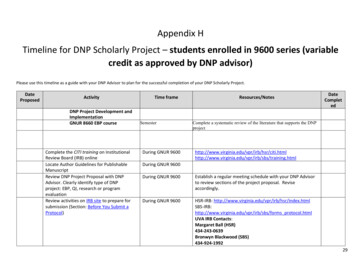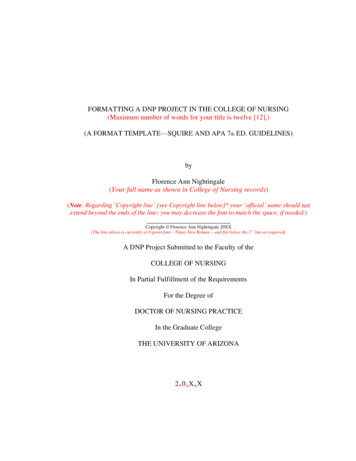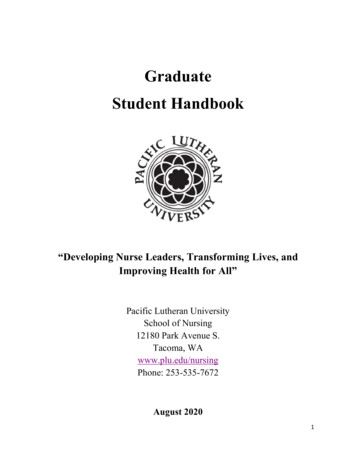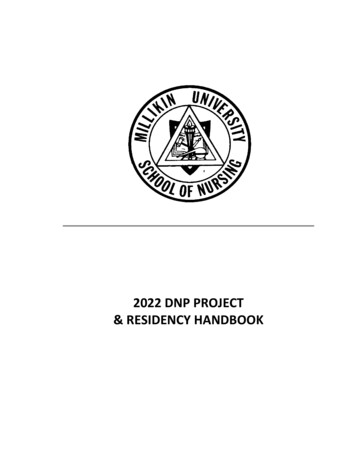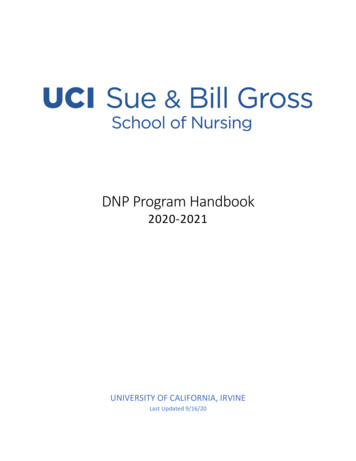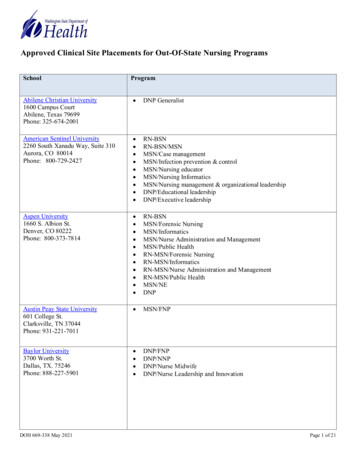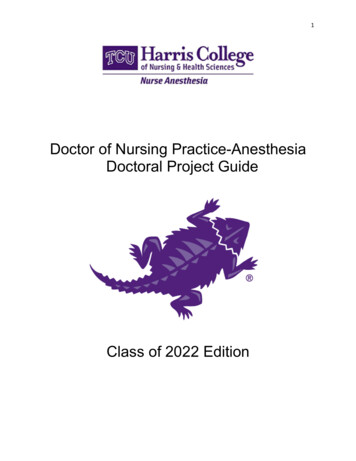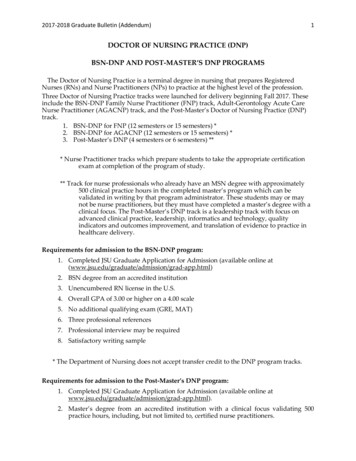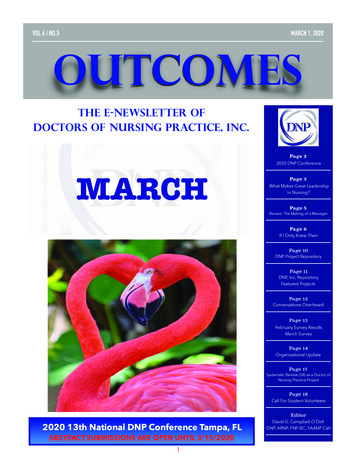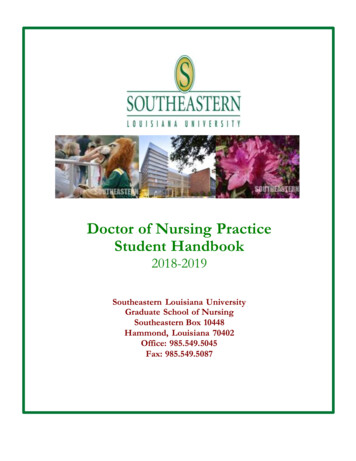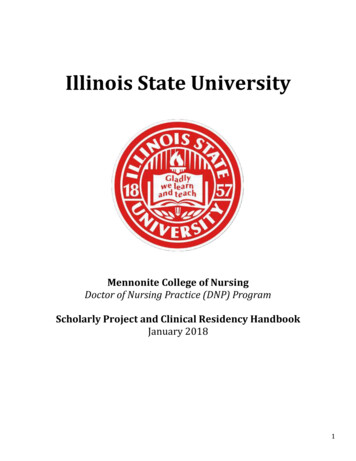
Transcription
Illinois State UniversityMennonite College of NursingDoctor of Nursing Practice (DNP) ProgramScholarly Project and Clinical Residency HandbookJanuary 20181
Table of ContentsPurpose of the Handbook3Key Contacts3Introduction to the Scholarly ProjectTypesMajor StepsBenchmarks with Deadlines (Scholarly Project)Faculty AdvisorScholarly Project Committee334-55-666-7Introduction to Clinical ResidencyResidency hoursResidency Contract, Objectives and EvaluationsClinical PreceptorPreceptor Support, Communications, and ResponsibilitiesClinical siteStudent evaluationClinical site and preceptor evaluationStudent LicensureProfessional PortfolioBenchmarks with Deadlines (Clinical Residency)7-8899-1010-111112121212-1313Appendix - Forms also available at larly Project Proposal OutlineRequest For Appointment of Scholarly Project CommitteeAuthorship Agreement FormChange of Scholarly Project Committee FormChange of Faculty Advisor FormDeclaration of DNP Residency FormDNP Preceptor Agreement FormDNP Clinical Residency LogPreceptor Evaluation of Student in Clinical ResidencyFaculty Evaluation of Student in Clinical ResidencyStudent Evaluation of Clinical ResidencyStudent and Faculty Evaluation of Preceptor and Site14-15161718192021-2223242526272
Purpose of the HandbookThe purpose of this handbook is to provide guidance to DNP students as they develop their ScholarlyProject and complete their Clinical Residency. This handbook includes information regarding the types ofprojects, steps, benchmarks, deadlines, and forms associated with this project. It also reviews the role offaculty advisors and scholarly project committees, and provides clinical residency guidelines.Key ContactsNameKim Astroth PhD, RNGraduate Program DirectorEdwards y@ilstu.eduTeresa Valerio, DNP, APN, FNP-BCDNP Program LeaderSarah PattenInstructional Experience CoordinatorMelissa MoodyGraduate Programs Advisor112JIntroduction to the Scholarly ProjectAll Doctor of Nursing Practice (DNP) students are expected to design and conduct a Scholarly Project, andthen disseminate the findings of the project through a variety of venues. The project demonstrates thestudent’s mastery of the DNP Essential Competencies (AACN, 2006) and provides the foundation forfuture scholarly endeavors. The project is to demonstrate identification and resolution of a practiceproblem through the scholarship of application. The primary objective of the project is the improvementof patient health outcomes in the practice setting.Types of Scholarly ProjectsThe Scholarly Project may take a variety of forms that may include, but is not limited to: Quality improvement Clinical practice guideline (development, application) Algorithm Tool kit Pilot study Program evaluation Practice model evaluation (new or existing) Delivery system model evaluation (new or existing) Health policy initiative White paperNOTE: These are examples and are not all inclusive3
Major StepsDevelopment of the Scholarly Project begins on entry into the DNP program. Student work in each coursebuilds a foundation for the Scholarly Project proposal. The formal development, implementation, andevaluation/dissemination of the Scholarly Project will be facilitated through three courses in the DNPcurriculum: Scholarly Project I: Development of the project Scholarly Project II: Implementation of the project Scholarly Project III: Evaluation and dissemination of the projectRelevant content related to the project will be included in these courses, as well as the application of materialfrom other courses within the DNP curriculum. The typical process, described in the following steps, will becompletion of Steps 1 and 2 during the Scholarly Project I course, Step 3 during Scholarly Project II, and Steps4 and 5 during Scholarly Project III.Step 1: Scholarly Project ProposalThe project proposal will include: Overview of the project Problem statement and background information including description of the project and how theproject intervention addresses at least one challenge or problem that influences healthcare for asignificant number of persons The need and feasibility of the project including market/risk analysis Projected leadership skills expected of the DNP graduate Evidence of stakeholder support for the project An evidence-based interventional proposal A timeline, which includes all phases of the project and is reasonable and comprehensive Evaluation plan with methodology and measures included that are evidence-based Budget (if applicable) with funding sources identified Evidence of IRB completionStep 2: Scholarly Project Proposal Approval and IRB ApplicationThe Scholarly Project Proposal must be presented to and approved by the committee members. The student mustset a Scholarly Project Approval Meeting that is mutually approved by all of the committee members. At least 14calendar days prior to this meeting, the student must submit a copy of the Scholarly Project Proposal to all of thecommittee members. At the meeting the student will present a PowerPoint presentation of the project to thecommittee members. The student will revise the written Scholarly Project Proposal based on feedback receivedfrom the Committee and return the revised proposal to the committee for final approval by a date agreed upon bythe committee members and the student. Upon written approval received from the committee, the DNP studentmay move forward with an IRB application. The chair of the Scholarly Project committee shall be listed as thePrincipal Investigator (PI) on the IRB application. Written approval of the IRB application must be presented tothe Scholarly Project committee upon completion of this step. At this point, the student and committee membersare to discuss authorship of future publication of the project and its findings and negotiate agreement of authors.The Authorship Agreement form is to be completed that this time.4
Step 3: Data CollectionOnce written approval from the IRB has been obtained, the DNP student may begin data collection. It is suggestedthat the student meet with the College statistician as needed. During this time the DNP student initiates regularcommunication with the Committee chair and members. At least monthly updates are expected.Step 4: Analysis/Synthesis of Findings and Summary of FindingsThe DNP student is to: Analyze, if appropriate, and synthesize findings from the project Establish conclusions and recommendations based on the synthesis of evidence from the project Develop a scholarly document to be presented to the Scholarly Project CommitteeStep 5: Dissemination of FindingsUpon completion of the Scholarly Project, the student is required to submit in writing, the formal report of theproject. The written report is to be submitted to all members of the Scholarly Project Committee for final approval.DisseminationTo meet DNP graduation requirements, dissemination of the Scholarly Project must include: A submitted poster presentation of the Scholarly Project at a professional conference as part of theScholarly Project I or II course. An on-campus presentation of the Scholarly Project to interested members of the College/Universitycommunity as part of the Scholarly Project II or III courses. A podium presentation of the completed project to either the stakeholder organization or setting or at aregional, state, or national professional conference at the completion of the Scholarly Project III course. A submitted manuscript of the completed project to a peer reviewed professional journal at the completionof the Scholarly Project III course.In all dissemination efforts, the student is to comply with the Authorship Agreement completed during Step 2 ofthe Scholarly Project process in terms of co-authorship. As such, dissemination efforts are to be approved by theScholarly Project chair prior to submission.Scholarly Project Benchmarks with DeadlinesBenchmarks have been created and used to guide students in the planning, development, and implementation ofthe Scholarly Project. The major benchmarks and deadlines are below.ActivityDeadlineCourse orIntensiveResponsiblePartiesSubmit:Scholarly ProjectProposal 1st draftMayIntensiveStudentFaculty AdvisorBring draft to IntensiveScholarly ProjectCommittee membersapprovedScholarly ProjectProposal approvedAugustPrior to NUR 543StudentFaculty AdvisorForm to MCN Office of Studentand Faculty ServicesOctoberNUR 543StudentCommitteeCourse FacultyFaculty Advisor5
Authorship ofscholarly productagreementNovemberNUR 543StudentCommitteeForm to MCN Office of Studentand Faculty ServicesIRB ProtocolapprovedJanuaryNUR 545StudentCommitteeCourse FacultyFaculty AdvisorPoster presentation(professionalconference or oncampus-as below)AprilNUR 543 or 545StudentCourse FacultyFaculty AdvisorOn-campuspresentationMayNUR 545 or 547StudentCourse FacultyFaculty AdvisorPodium presentationJanuary-JulyNUR 545 or 547StudentCourse FacultyFaculty AdvisorManuscript approvedJulyNUR 547StudentCommitteeCourse FacultyFaculty AdvisorManuscript submittedAugustNUR 547StudentFaculty AdvisorProfessional journalManuscript depositedat ISUAugustNUR 547StudentISUReDFaculty AdvisorEvery DNP student will be provided with a faculty advisor who will guide him or her through the DNPprogram. The student’s faculty advisor will serve as chair of the Scholarly Project Committee. Ideally, studentsare matched with a faculty member upon admission to the program who has a scholarly interest or expertise inthe student’s area of focus for the Scholarly Project. Faculty advisors will be doctorally-prepared.The student is encouraged to communicate with their faculty advisor at least every semester before entering intothe scholarly project and residency courses. During their scholarly project course work, the student shouldcommunicate with the faculty advisor at least monthly.Scholarly Project CommitteeThe Scholarly Project will be under the direction of a Mennonite College of Nursing faculty member. Thestructure of the committee will be two to three individuals. The size of the committee should take into accountthe strengths and limitations of both the DNP student and his/her faculty chairperson, with two goals in mind.First, there needs to be an alignment of the DNP student with appropriate research and/or content experts in thearea of the proposed Scholarly Project. Second, the committee structure needs to be such that the project can becompleted in a timely manner so as to increase the impact of the project on the intended clinical site and/orpopulation.The faculty advisor will serve as the chair of the Scholarly Project Committee. The second member of thecommittee will be the preceptor (master’s or preferably doctoral-prepared) within the organization or setting6
where the project is taking place. If needed, a third person may be added to the committee who has specificexpertise applicable to the project.Selection of Scholarly Project Committee members should be completed prior to the student’s enrollment in theScholarly Project I course. The “Request for Appointment of Scholarly Project Committee” form is to becompleted and submitted to Mennonite College of Nursing Office of Student and Faculty Services. Anychanges in the committee composition must be approved by the student’s faculty advisor and notification givento the Office of Student and Faculty Services.Introduction to Clinical ResidencyThe DNP Clinical Residency is considered a key component of the Doctor of Nursing Practiceeducational program that combines clinical experiences with scholarly activities to provide in-depthlearning for students. It provides an opportunity for meaningful engagement with experts fromnursing, as well as other disciplines. During residency, the students integrate and synthesizeknowledge by demonstrating competency in an area of nursing practice, completing a scholarly projectand writing a publishable paper based on their project. The DNP residency is designed to provide theDNP student with a comprehensive clinical experience individually designed to meet the professionaland clinical goals of each DNP student. Residency provides an opportunity for further synthesis andexpansion of the learning and leadership developed to that point.In addition to clinical practice, Mennonite College of Nursing DNP students are expected to reflect onclinical practice and pursue independent study, such as participation in presentations, rounds andseminars. Students integrate scholarly reading, educational offerings and clinical experience to developtheir scholarly project that demonstrates increasingly complex and proficient practice. Graduates of theDNP program are expected to demonstrate highly refined clinical and professional skills. Graduates ofthe program will acquire and are expected to demonstrate, a fund of knowledge, skills and abilities thatenhance advanced nursing practice including: Refined communication, reflection and scholarly skills, Advanced scientific foundation, Progressive organizational and systems leadership thinking with a focus on quality improvement, Honed patient care expertise with an emphasis on independent and inter-professionalclinical practice, Superior analytic skills for appraising, implementing, and evaluating evidence-based, directand indirect patient care across populations and settings, Advanced knowledge of health policy, informatics, and health care delivery systems.Prior to starting residency hours, students must insure affiliation agreements are in place for clinicalsites and preceptor approval. The faculty advisor, course faculty, and Clinical Practice Coordinator workwith the student on the adequacy of the clinical placements and maintain the student evaluations inpartnership with the clinical site preceptor. The course faculty, faculty advisor, along with their clinicalpreceptor/mentor, works with students to coordinate the DNP Scholarly Project. The residencyexperience broadens the student’s exposure within his or her advanced nursing role, and deepens andenriches the student’s clinical ability in that specialty. Post-MSN DNP students do not acquire a newspecialty; however, these students will expand knowledge and skill in their specialty and focus onbuilding clinical leadership skills.There are key aspects of the residency: Completed in the final three (3) semesters of the program with Scholarly Project courses7
Key component of DNP educationSynthesis of knowledgeFocus on clinical leadership skillsOngoing portfolio developmentThe essential components of residency are scholarly activities, healthcare leadership skills, andprofessional development. These components are documented through written and clinical experiencesin developing, implementing, and evaluating a scholarly project that result in a scholarly manuscriptsubmitted to a professional journal. The DNP student assumes an expanded scope of practice forpatients; provides leadership to foster intra-professional and inter-professional collaboration,demonstrate skills in peer review that promote a culture of evidence, and apply clinical investigativeskills to evaluate patient health outcomes. Students must demonstrate ability to write professionallyand influence health policy. The clinical experiences can include a wide variety of sites.Residency HoursPrior to entering the DNP residency, up to 640 hours of post-BSN faculty supervised clinical hours arerequired (with approval, up to an additional 40 hours may be completed in NUR 550 Scholarly Project1 to meet the 640 hours). Incorporated into the DNP residency courses (NUR 550, NUR 552, NUR 554)are 360 clinical hours (120 hours per course) related to the student’s unique area of interest thatsupport the scholarly project, development of leadership skills and clinical practice skills. One thousand(1000) faculty-supervised, post-BSN hours is the minimal requirement to graduate.Clinical hours may consist of mentored learning that provides a broad range of activities; in addition toautonomous clinical hours such as leadership, practice inquiry, and policy.All clinical residency hours must be at the doctoral level, and directly related to the scholarly project orachievement of the DNP Essentials Competencies (AACN, 2006). The following activities are someexamples of time that can be applied toward residency hours: Time in the healthcare arena working on some aspect of the scholarly project. Time spent with a preceptor/agency in an area of specialization doing patient care (hoursdedicated to DNP level experience and beyond the student’s current role). Special projects related to advanced nursing practice specialization. Time spent in a clinical agency’s committees. Time spent participating in a health initiative in the agency, healthcare system, state or nationalagency. Time spent in formal skill building to develop, implement, or evaluate scholarly project (such astutorials, meetings, consultation with experts, professional, or community conferenceattendance). Time spent in formal skill building to develop advanced skills in the nursing practice specialty.Usually, this would include new knowledge/skills that were not included in MSN education.Clinical hours do not include: Time spent in activities required for another DNP course. Time spent in conferences that are counted toward a course in which you receive credit. Time spent traveling to and from conferences. Time spent in CE programs will be applied to DNP clinical hours on a case-by- case basis.8
Residency Contract, Objectives, and EvaluationThe purpose of the clinical experience for residency is to increase the student’s exposure to andinvolvement in doctoral level clinical practice leadership under the direction of a preceptor/mentor.The student is responsible for identifying and initiating a contract with a clinical preceptor/mentorinvolved in or with expertise in practice. Input from the faculty advisor, course faculty, or ClinicalPractice Coordinator may be needed as the contract is developed. This process starts with completingDNP Preceptor Agreement Form located on the course site and DNP Student Handbook. Prior to thebeginning the clinical experience the Mennonite College of Nursing must receive required informationfrom the clinical preceptor and have a current agency contract.The student and clinical preceptor must establish mutually agreed upon objectives and evaluationcriteria. The specific objectives and evaluation criteria will depend on the practice focus in which thestudent is participating and the student’s educational needs. Objectives must address active involvementby the student in the clinical experiences and influences on patient health outcomes. Once student andpreceptor/mentor have developed and agreed upon the objectives and evaluation criteria, the coursefaculty will review and either approve or request revisions before acceptance. The student/preceptorobjectives and evaluation criteria will be added to the DNP Essential Competencies to complete theevaluation. The clinical preceptor/mentor and course faculty will decide if the objectives were met.Clinical PreceptorDNP students will select, with the input and approval from their faculty advisor or course faculty, aclinical preceptor for the clinical experience. If the student has more than one clinical experience fortheir residency experience, additional clinical preceptors and residency contracts may be needed. Theclinical preceptor must be an expert in the clinical or administrative area in which the DNP studentwishes to develop expertise and can facilitate work on their scholarly project. The preceptor may notbe the immediate work supervisor of the DNP student.There are currently few nurses prepared at the DNP level who can serve as the clinical preceptor toDNP students. Therefore, the clinical preceptor will not necessarily be a DNP-prepared nurse. Apreceptor may be a professional with a master’s or doctoral degree (preference is given to doctoralprepared professionals), for example; An advanced practice nurse with considerable experience and recognition as an expert certifiedin a particular clinical field A physician with specialized training and experience A nurse with an administrative position as the Director, Vice President, President or CEO withina health care organization Other health care professionals in senior leadership positionsThe clinical preceptor must hold a position in the organization where he/she can facilitate the DNPstudent’s access to organizational information, decision makers, and other personnel in order tocomplete the development and implementation of the DNP student’s clinical project over a three (3)semester residency within the organization.The clinical preceptor may be nationally certified in their specialty. They must have worked at their sitefor at least one year and be willing be available to the student, develop objectives, and complete studentevaluations as required.9
When possible and practical, the DNP student is encouraged to select a clinical preceptor outside oftheir current work setting. In large organizations, for example the DNP student would be placed for theclinical scholarship courses with a clinical preceptor outside the department or unit where they areemployed. The line between current employment and clinical scholarship hours and project mustremain clear to the organization, the clinical preceptor, the DNP Scholarly Project committee, the coursefaculty, and the DNP student. The DNP student must be able to demonstrate the achievement of the DNPEssential Competencies, regardless of whether they are in their current place of employment or adifferent clinical setting (AACN, 2006).Preceptor Support,Communication,andResponsibilitiesThe course faculty will communicate with the clinical preceptor during the semester. The clinicalresidency objectives and evaluation criteria will be developed by the student with the preceptors’ input,approved by the course faculty, and used to evaluate the student’s performance during the semester.Lines of communication with the clinical preceptor and course faculty will be established early in eachsemester. Expected student outcomes and the evaluation process will be reviewed. Telephone,electronic or in-person conferences will be held at least once early in the clinical experience and again atthe middle of the clinical experience to monitor and evaluate the student’s progress. If there is anyconcern regarding individual student progress, more frequent contacts with the clinical preceptor mayoccur initiated by either the clinical preceptor or course faculty.In general, the preceptor’s responsibilities are to guide and facilitate the student in their scholarlyproject work and development of advanced healthcare leadership skills. The following informationoutlines the usual preceptor responsibilities for each of the three clinical residency courses.NUR 550 Clinical Residency I Primary role is to guide and facilitate the student within the organization and healthcareprofession to develop their scholarly project, advanced leadership and clinical skills Key preceptor activities in this course are;o provide input into the student developed objectives,o advise the student on organizational culture and leadership,o guide the development of the project proposal,o facilitate the student’s activities in the organization and healthcare professions,o meet with student every 1-2 weeks through the semester,o meet with the student and faculty at mid-term,o evaluate the students’ performance at the end of the semester.NUR 552 Clinical Residency II Primary role to guide and facilitate the student within the organization and healthcareprofession to implement their scholarly project, further develop advanced leadership andclinical skills Key preceptor activities in this course are;o provide input into student developed objectives,o advise the student on organizational culture and leadership,o guide the implementation of the project,o facilitate the student’s activities in the organization and healthcare professions,o meet with student every 1-2 weeks through the semester,o respond to faculty communication at mid-term,o evaluate the students’ performance at the end of the semester.10
NUR 554 Clinical Residency III Primary role to guide and facilitate the student within the organization and healthcareprofession to evaluate their scholarly project, further develop advanced leadership and clinicalskills Key preceptor activities in this course are;o provide input into student developed objectives,o advise the student on organizational culture and leadership,o guide the evaluation of the project,o facilitate the student’s activities in the organization and healthcare professions,o meet with student every 1-2 weeks through the semester,o communicate to faculty, as needed, regarding the student’s performance,o evaluate the students’ performance at the end of the semester.Clinical SiteStudents secure their own clinical residency site, which may or may not be in Illinois. Students areencouraged to identify potential residency sites and clinical preceptor soon after admission to theprogram; especially if outside Illinois, as other state requirements may not allow Mennonite College ofNursing to utilize clinical sites for clinical residency experiences. The residency site may include a paidposition. When considering paid positions, students are advised to consider the positionresponsibilities as well as their learning needs and negotiate unpaid time for academic experiences,clinical learning opportunities, and clinical scholarship, which are all part of the residency.The clinical site for the residency is important to the development and implementation of the DNPScholarly Project. DNP students are encouraged to select a clinical site that can provide the requiredfacilities and clinical experts for their growth. The clinical site may be a hospital, a health care system,an insurance company, a public health agency, a research institute, a professional organization, anonprofit agency, or other organization.Mennonite College of Nursing must have an agency contract with the clinical site prior to the studentbeginning clinical residency. The clinical affiliation agreement must be in place for each clinical site.The DNP student should begin discussing possible clinical sites in the first semester of the DNPprogram with their faculty advisor. One (1) semester prior to the student beginning the clinicalresidency course, the student and the clinical preceptor must complete the DNP Clinical PreceptorForm found in the DNP Student Handbook and scan/email or fax it to the Clinical Practice Coordinator asnoted on the form. Once the site has been approved, the Clinical Practice Coordinator will notify thestudent via Illinois State University email. Please remember this is not the same document as the clinicalagency affiliation. This is a planning form so that a contract can be processed between the agenciesinvolved. The legal contract will go to the preceptor’s agency directly from the Mennonite College ofNursing, if a current contract is not already in place. Failure to complete the form accurately andentirely can slow the contract process and may prevent the student from beginning the clinicalexperience. Completing new facility contracts are extremely time consuming. The student must startwell before the clinical residency course or they may not be able to complete the clinical requirements.The Clinical Practice Coordinator will assist the student with the process, but it is the responsibility ofthe student to obtain a completed DNP Preceptor Agreement Form so that the College of Nursing canwork directly with leadership at the facility to get the necessary legal contract signed.11
Student evaluationEvaluating role performance requires regular communication and interaction of the student with theclinical preceptor and course faculty. Clinical preceptors and course faculty will evaluate the studenteach semester. Additionally, the student will conduct a self-evaluation. Once the preceptor evaluationform is completed, the preceptor can provide to the student or send directly to the course faculty. Thestudent is to review and sign the evaluation. The course faculty will review, seek clarification ifneeded, and include the results in the student’s course grade. At any time if a student is havingdifficulty in clinical the clinical preceptor and course faculty will discuss the issues by telephoneconference and develop a plan for the student. DNP Clinical Residency Logs will also be reviewed andapproved by course faculty each semester.Clinical Site and Preceptor EvaluationStudents will evaluate their clinical site and clinical preceptors each semester. Course faculty willevaluate the adequacy of the clinical site each semester through their interactions with the preceptor,and by reviewing the clinical site evaluations as well as the achievement of the DNP clinical residencyobjectives and evaluation.Student LicensureEach student is responsible for obtaining and maintaining a current or unencumbered registerednurse licensure or advanced practice nurse licensure as applicable in the state(s) in which the studentis participating in clinical experiences. Failure to do so will result in loss of credit for those clinicalhours, and administrative withdrawal from the courses involved. The students must have a copy of thenursing license (RN and/or APN) and state of licensure on file with the Mennonite College of Nursing.Professional PortfolioStudents are expected to develop a professional portfolio. The development and maintenance of aprofessional portfolio reflects students’ self-responsibility in their own learning, actively constructinghow competencie
the strengths and limitations of both the DNP student and his/her faculty chairperson, with two goals in mind. First, there needs to be an alignment of the DNP student with appropriate research and/or content experts in the area of the proposed Scholarly Project. Second, the committee structure needs to be such that the project can be
